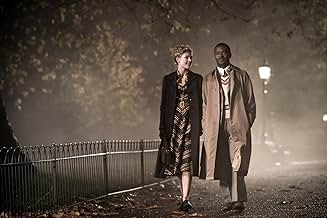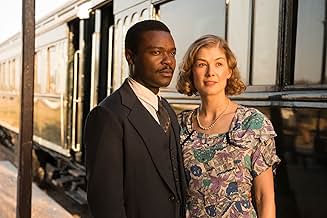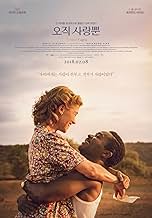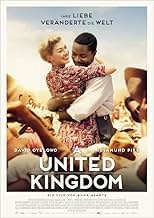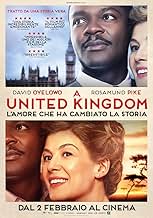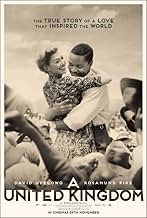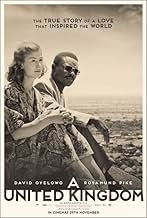IMDb-BEWERTUNG
6,9/10
17.459
IHRE BEWERTUNG
Prinz Seretse Khama von Botswana verursacht internationalen Aufruhr, als er Ende der 1940er-Jahre eine weiße Frau aus London heiratet.Prinz Seretse Khama von Botswana verursacht internationalen Aufruhr, als er Ende der 1940er-Jahre eine weiße Frau aus London heiratet.Prinz Seretse Khama von Botswana verursacht internationalen Aufruhr, als er Ende der 1940er-Jahre eine weiße Frau aus London heiratet.
- Auszeichnungen
- 6 Gewinne & 5 Nominierungen insgesamt
Empfohlene Bewertungen
At first I thought this movie would ruin this story. It's a painful, yet hopeful and loving chapter of African history. This is NOT a love story. If people should come to watch this movie hoping for a "love conquers all" plot... They should be very disappointed. And I'm fairly glad for that. I congratulate the director, Amma Asante, for rendering this story into the big screen with delicacy and respect to all involved. I thank her for realizing all this story was NOT, and putting it out for the public from the first frame. I also love her for showing almost everything this story was about, without going into great detail.
This movie is based on the true relationship between the King of (now) Botswana, Sir Seretse Khama, and a white British woman, Ruth Williams. Today we might know Ruth and Khama as leaders in the fight for the country's independence (since it was, when they married, a British protectorate), but their struggle started way sooner. Their story became their country's story. A fight for their right to choose.
It's not about their love. It's about his choice, not to marry within his tribe's customs, and her choice, to up and leave her home, building herself a new life from scratch. It's about a country's choice to their leader - and how much the world hates him, her and the country for the nerve to demand their voices be heard with such fire.
Amma Asante thrives on sewing up Seretse and Ruth deep within the political setting, in a beautiful dance, until we cannot see the lines between them. She also shows how much resistance change can face - and overcome. Their marriage becomes a set of lens for the viewer to analyze strength and frailty confined in this tiny world full of hope. And it gets you going.
Rosamund Pike and Daniel Oyelowo are simply superb. His performance here is stronger than Selma's, which is saying something. And though Pike had less screen time than Oyelowo, her presence is felt throughout every scene. It doesn't fail. Pike gives a poignant performance of a true turnaround in life, and she gets us engaged with her every move. She doesn't have to show her face; every spin this movie gives gets the viewer thinking about Ruth's reaction, thanks to her powerful deliverance.
With that power couple, I thought the supporting cast would be weak and acceptable... I was surprised. Again. Tom Felton, Jack Davenport, Laura Carmichael (why, hello, Lady Edith!), Terry Pheto, Vusi Kunene, Jessica Oyelowo and Abena Ayivor, to name a (very) few, were splendid in their roles and really brought the tension between marriage and politics alive.
Cinematography is delightful, which goes really well with the dazzling music score. The somber tones of post-war London are contrast to the joyful sounds and colors of the southern borders of Africa; yet you hear pain in their laughter as well as you see smiles in British tears. Everything is designed to really bring the viewer there and then.
It's an interesting and delicate take in a true story, that happened not so long ago. It's a solid 7, because of historical inconsistencies throughout the film (the lasting of the protectorate, Indian's ruler at the time of independence, and so on), but it's definitely worth at least a screening.
This movie is based on the true relationship between the King of (now) Botswana, Sir Seretse Khama, and a white British woman, Ruth Williams. Today we might know Ruth and Khama as leaders in the fight for the country's independence (since it was, when they married, a British protectorate), but their struggle started way sooner. Their story became their country's story. A fight for their right to choose.
It's not about their love. It's about his choice, not to marry within his tribe's customs, and her choice, to up and leave her home, building herself a new life from scratch. It's about a country's choice to their leader - and how much the world hates him, her and the country for the nerve to demand their voices be heard with such fire.
Amma Asante thrives on sewing up Seretse and Ruth deep within the political setting, in a beautiful dance, until we cannot see the lines between them. She also shows how much resistance change can face - and overcome. Their marriage becomes a set of lens for the viewer to analyze strength and frailty confined in this tiny world full of hope. And it gets you going.
Rosamund Pike and Daniel Oyelowo are simply superb. His performance here is stronger than Selma's, which is saying something. And though Pike had less screen time than Oyelowo, her presence is felt throughout every scene. It doesn't fail. Pike gives a poignant performance of a true turnaround in life, and she gets us engaged with her every move. She doesn't have to show her face; every spin this movie gives gets the viewer thinking about Ruth's reaction, thanks to her powerful deliverance.
With that power couple, I thought the supporting cast would be weak and acceptable... I was surprised. Again. Tom Felton, Jack Davenport, Laura Carmichael (why, hello, Lady Edith!), Terry Pheto, Vusi Kunene, Jessica Oyelowo and Abena Ayivor, to name a (very) few, were splendid in their roles and really brought the tension between marriage and politics alive.
Cinematography is delightful, which goes really well with the dazzling music score. The somber tones of post-war London are contrast to the joyful sounds and colors of the southern borders of Africa; yet you hear pain in their laughter as well as you see smiles in British tears. Everything is designed to really bring the viewer there and then.
It's an interesting and delicate take in a true story, that happened not so long ago. It's a solid 7, because of historical inconsistencies throughout the film (the lasting of the protectorate, Indian's ruler at the time of independence, and so on), but it's definitely worth at least a screening.
This is one of those movies that is flying under the radar and deserves to be seen. It is a wonderful story, well scripted, well acted, and has terrific cinematography. The fact that is a true story makes one wonder what the hell we have been learning in school when we have never been taught this type of history. I give this a ten and really it deserves it. It is a shame people have degraded the rating for some reason other than the fact that this is good cinema. It is a very deserving movie and is like the movie Hidden Figures or Queen Katwe, it is important for history. I am a white conservative and think everyone should see the movie.
10pyor66
I lived in Botswana for twenty-five odd years and enjoyed every single moment of it, almost certainly due in large measure to Seretse's enlightened politics and the genuine and natural warmth of the Botswana people. I knew both main characters quite well. Seretse was a very approachable man, even as president, and it was a pleasure to spend some time in his company. He was a man well loved by everyone, black and white. In fact, in Botswana one scarcely thought in those terms. As a politician he had huge charisma and was a great orator. He was also a born leader. I remember well being told by insiders that government Ministers who were in trouble for minor abuse of office or the like, would tremble in fear outside his office when they were to be 'carpeted'.
Ruth was an extraordinarily capable woman and even in her later years had more stamina than almost anyone I have known. She was at work in her office in Gaborone from early morning to the end of the day, patron of the Red Cross, Botswana Council of Women etc etc. Contrary, however, to one reviewer's criticism, Rosalind Pike's portrayal was quite accurate. She was not a strident campaigner but a very effective mover who enjoyed a social life and had many friends. In her widowhood she received constant visits from senior members of the tribe and government and was widely loved and respected by her people. She was most certainly "Mohumagadi" - Mother of the Nation.
This film portrays their personalities pretty accurately and the characterisation of the actors is extraordinarily true to life. Both David Oyelowo and Rosamund Pike were absolutely convincing. The quality of the acting very quickly overcame my initial niggling concern that the physical likenesses were not quite there. The photography of Botswana was outstanding and the familiar views of Serowe from the Palapye 'road' and the scenes in the kgotla were quite emotional for me; I unexpectedly found I had a lump in my throat.
I can understand that, for others, the film may not have the immediacy it has for me, perhaps, but previous criticisms of 'cold' and 'unemotional' - No! Leaving aside my personal interest, it deserved to be the opener for the London Film Festival. Maybe not a total "blockbuster" but an unusual and great film nonetheless. Very close to fact.
Ruth was an extraordinarily capable woman and even in her later years had more stamina than almost anyone I have known. She was at work in her office in Gaborone from early morning to the end of the day, patron of the Red Cross, Botswana Council of Women etc etc. Contrary, however, to one reviewer's criticism, Rosalind Pike's portrayal was quite accurate. She was not a strident campaigner but a very effective mover who enjoyed a social life and had many friends. In her widowhood she received constant visits from senior members of the tribe and government and was widely loved and respected by her people. She was most certainly "Mohumagadi" - Mother of the Nation.
This film portrays their personalities pretty accurately and the characterisation of the actors is extraordinarily true to life. Both David Oyelowo and Rosamund Pike were absolutely convincing. The quality of the acting very quickly overcame my initial niggling concern that the physical likenesses were not quite there. The photography of Botswana was outstanding and the familiar views of Serowe from the Palapye 'road' and the scenes in the kgotla were quite emotional for me; I unexpectedly found I had a lump in my throat.
I can understand that, for others, the film may not have the immediacy it has for me, perhaps, but previous criticisms of 'cold' and 'unemotional' - No! Leaving aside my personal interest, it deserved to be the opener for the London Film Festival. Maybe not a total "blockbuster" but an unusual and great film nonetheless. Very close to fact.
"A United Kingdom" is based on the true-life relationship between Sir Seretse Khama, an African chieftain from what was then the Bechuanaland Protectorate, and a white British woman, Ruth Williams. The film implies that he was the King of Bechuanaland, but in fact no single individual ever held this position; Khama was the ruler of the Bangwatho, one of a number of tribes making up the Tswana nation, the largest ethnic group in the country. In Botswana, as Bechuanaland is now known, Khama and Ruth are today revered figures, as he was the leader of the country's independence movement and its first President when independence was achieved in 1966; unlike most other former colonies in Africa Botswana has remained a democracy ever since, and their son is the current President.
Khama's marriage to Ruth Williams (they met while he was studying in London in 1948) was highly controversial at the time. Many of Khama's own people, led by his uncle, refused to accept Ruth as their Queen. The South African government, which was just starting to introduce its policy of apartheid, objected furiously to the idea of a high-profile black leader in a neighbouring country marrying a white woman. Clement Attlee's Labour government, anxious to placate the South Africans who were threatening to leave the Commonwealth, intervened, exiling Khama from Bechuanaland and forbidding him to return. Winston Churchill, at the time leader of the Opposition, initially made sympathetic noises, but after the Conservatives were returned to power in 1951 he took an even harder line than Attlee. The situation was complicated by the discovery of diamonds in the territory; the British government, using the rift between Khama and his uncle as a pretext, threatened to revoke Bechuanaland's status as a Protectorate and declare it a Crown Colony. (The real reason was that in a Protectorate mineral rights belonged to the local people, whereas in a colony they belonged to the colonial power). One of Khama's few British allies was the Labour MP Tony Benn.
The action switches between an austere, drab post-war Britain and a bright sunlit Africa. The recreation of historical detail is well done and both the leading actors, David Oyelowo as Khama and Rosamund Pike as Ruth, are excellent. The film is an interesting look at a historical romance which made the headlines at the time but which today is largely forgotten, at least in Britain. 7/10
Some goofs. We hear a radio broadcast on the eve of Indian independence in 1947 telling us that Indians would go to bed "subjects of the Queen". Britain still had a King, George VI, in 1947. We are told that Queen Victoria made Bechuanaland a Protectorate to protect its people from "racist South Africa", but the Protectorate was created in 1885, twenty-five years before South Africa came into existence as a single nation. (In 1885 it was still a patchwork of British colonies and Boer republics). Prime Minister Attlee claims that the Presidents of South Africa, South-West Africa and the two Rhodesias were all opposed to Khama's marriage to Ruth. During Attlee's term of office (1945-51) none of these territories had a President.
Khama's marriage to Ruth Williams (they met while he was studying in London in 1948) was highly controversial at the time. Many of Khama's own people, led by his uncle, refused to accept Ruth as their Queen. The South African government, which was just starting to introduce its policy of apartheid, objected furiously to the idea of a high-profile black leader in a neighbouring country marrying a white woman. Clement Attlee's Labour government, anxious to placate the South Africans who were threatening to leave the Commonwealth, intervened, exiling Khama from Bechuanaland and forbidding him to return. Winston Churchill, at the time leader of the Opposition, initially made sympathetic noises, but after the Conservatives were returned to power in 1951 he took an even harder line than Attlee. The situation was complicated by the discovery of diamonds in the territory; the British government, using the rift between Khama and his uncle as a pretext, threatened to revoke Bechuanaland's status as a Protectorate and declare it a Crown Colony. (The real reason was that in a Protectorate mineral rights belonged to the local people, whereas in a colony they belonged to the colonial power). One of Khama's few British allies was the Labour MP Tony Benn.
The action switches between an austere, drab post-war Britain and a bright sunlit Africa. The recreation of historical detail is well done and both the leading actors, David Oyelowo as Khama and Rosamund Pike as Ruth, are excellent. The film is an interesting look at a historical romance which made the headlines at the time but which today is largely forgotten, at least in Britain. 7/10
Some goofs. We hear a radio broadcast on the eve of Indian independence in 1947 telling us that Indians would go to bed "subjects of the Queen". Britain still had a King, George VI, in 1947. We are told that Queen Victoria made Bechuanaland a Protectorate to protect its people from "racist South Africa", but the Protectorate was created in 1885, twenty-five years before South Africa came into existence as a single nation. (In 1885 it was still a patchwork of British colonies and Boer republics). Prime Minister Attlee claims that the Presidents of South Africa, South-West Africa and the two Rhodesias were all opposed to Khama's marriage to Ruth. During Attlee's term of office (1945-51) none of these territories had a President.
6.8 does not do justice to a film that tells a story of how love can overcome boundaries. In this case, this is one of the rare African stories that we tend to get to hear about. For a long time, stories to do with Africa have been about disease, poverty and undernourishment. Asante's take on this film does indeed tell the viewer that there is more to Africa than what meets the eye.
I believe that this film should set a precedent for more African stories to be told . This film tells you that there is a lot more than just about Mandela. There is need to learn about other Africans namely Jomo Kenyatta, Hastings Kamuzu Banda, John Chilembwe and many others. These are perhaps some of the few names that I can think of. I commend Asante for taking a bold stand in producing a film of a figure(s) that most people out there may have not heard.
For those of you that may want to get a different side to Africa, I would recommend that you begin by watching "A United Kingdom". In my view, it is one of the more decent films of 2016/17 combined.
I believe that this film should set a precedent for more African stories to be told . This film tells you that there is a lot more than just about Mandela. There is need to learn about other Africans namely Jomo Kenyatta, Hastings Kamuzu Banda, John Chilembwe and many others. These are perhaps some of the few names that I can think of. I commend Asante for taking a bold stand in producing a film of a figure(s) that most people out there may have not heard.
For those of you that may want to get a different side to Africa, I would recommend that you begin by watching "A United Kingdom". In my view, it is one of the more decent films of 2016/17 combined.
Wusstest du schon
- WissenswertesThe house used as Ruth & Seretse's home in the film was the home of the real Ruth & Seretse.
- PatzerAt about 1'17, the civil servant refers to the new Prime Minister as Sir Winston Churchill. He was not knighted until 1953.
- Zitate
Seretse Khama: No man is free who is not master of himself.
- VerbindungenFeatured in Film '72: Folge #45.8 (2016)
- SoundtracksNo Baby, No Nobody But You
Lyrics and Music by Seger Ellis
Performed by Stan Kenton and June Christy
Published by EMI United Partnership Ltd/EMI Music Publishing Ltd
Licensed Courtesy of Capitol Records Inc.
Under Licence from Universal Music Operations Ltd
Top-Auswahl
Melde dich zum Bewerten an und greife auf die Watchlist für personalisierte Empfehlungen zu.
- How long is A United Kingdom?Powered by Alexa
Details
- Erscheinungsdatum
- Herkunftsländer
- Offizieller Standort
- Sprachen
- Auch bekannt als
- A United Kingdom
- Drehorte
- Produktionsfirmen
- Weitere beteiligte Unternehmen bei IMDbPro anzeigen
Box Office
- Budget
- 14.000.000 $ (geschätzt)
- Bruttoertrag in den USA und Kanada
- 3.902.185 $
- Eröffnungswochenende in den USA und in Kanada
- 66.510 $
- 12. Feb. 2017
- Weltweiter Bruttoertrag
- 14.459.330 $
- Laufzeit
- 1 Std. 51 Min.(111 min)
- Farbe
- Seitenverhältnis
- 2.35 : 1
Zu dieser Seite beitragen
Bearbeitung vorschlagen oder fehlenden Inhalt hinzufügen







